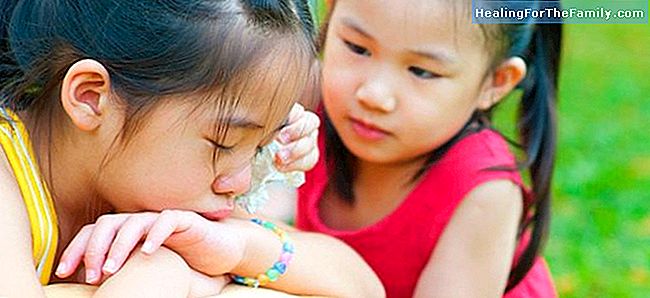Fears of children according to their age
Being afraid is common in children. The fears of the children are evolutionary, that is, they change according to the age of the child and this gives rise to not having fear of the same things as children grow up. The key is to learn to overcome each one at the time and at the age at which it appear
Being afraid is common in children. The fears of the children are evolutionary, that is, they change according to the age of the child and this gives rise to not having fear of the same things as children grow up. The key is to learn to overcome each one at the time and at the age at which it appears, preventing them from becoming stagnant and the child accumulating fears throughout his or her growth.
The psychologist Silvia Álava, coordinator of the Infant Section of the Álava-Reyes Consultores Psychology Center, helps parents understand the fears of children and offers us excellent advice to overcome fear.
A fear for each age of the children

Fears grow with the children. What are the children afraid of depending on their age?There are ages when evolutionarily speaking it is normal to be afraid. Children at two, four or even six years go through a stage of fear. Many times, for example, fear of the dark is very common. The parents have to know that it is something normal and that we can often fix it by putting a little light in their room, which projects an indirect light. What we can not do is reinforce that fear.
What are the evolutionary fears and at what age do they occur?At six months, the child already begins with the fear of strangers. He begins to miss his reference adult, who is usually his mother. After six months the fear of strangers begins and the child begins to miss parents when they are not there. Therefore, it is good for children to leave their parents' room at night around five months, so that when they wake up, they will not miss their reference figures, their mother and father.
Around two years, there is a certain fear of 'abandonment'. When you leave the child at daycare with two years, sometimes it is a little more restless. The most likely thing is that the child is anguished a little, is left crying, and after five minutes has already passed, he starts playing, he is happy with the rest of the children. The problem we would have with a child that we see that has already passed that period of adaptation, that period of fear or anguish of separation and does not begin to be clear that his father will return and throws all morning crying. There it is necessary to value that there can not be another problem.
At four years, fear of darkness may appear. We do not need to be very clear about 'You have to sleep with the light completely off and with the shutter down'. It's okay to leave a small indirect light, in fact they also sell many small lights that can be put in a socket, or a small lamp at night, that projects a light that is an indirect light that simply gives the child a little bit of security because it is not totally dark.
What are older children afraid of?
They tend to fear animals. Children who since childhood have been in contact with animals do not usually develop any fear. But when a child, around three or five years old, encounters a large dog, he usually feels a little afraid. You have to teach him that if he is a well-known dog, nothing will happen to him. If it is not a dog that we know and maybe the animal is twice the size of the child, it is normal to be afraid and to stand still. The child does not have to go to touch him because we do not know if the dog is educated enough not to bite him. On the subject of fear of dogs, we must distinguish to what extent is fear and to what extent is prudence.
What else can we do to dismantle the fears of children?Unraveling. It is the same with nightmares, it is normal for children around two years, four or even six years, wake up with nightmares and have a little fear at night. That's as simple as getting to your room and reassuring them a little bit. Many times it can help us to give them a little water, two kisses, tell them that they will not be afraid again, that they will not worry, and leave them sleeping in their bed. If we pass him to our bed, we can generate a bigger problem.
Marisol New. Editor of Guiainfantil.com












